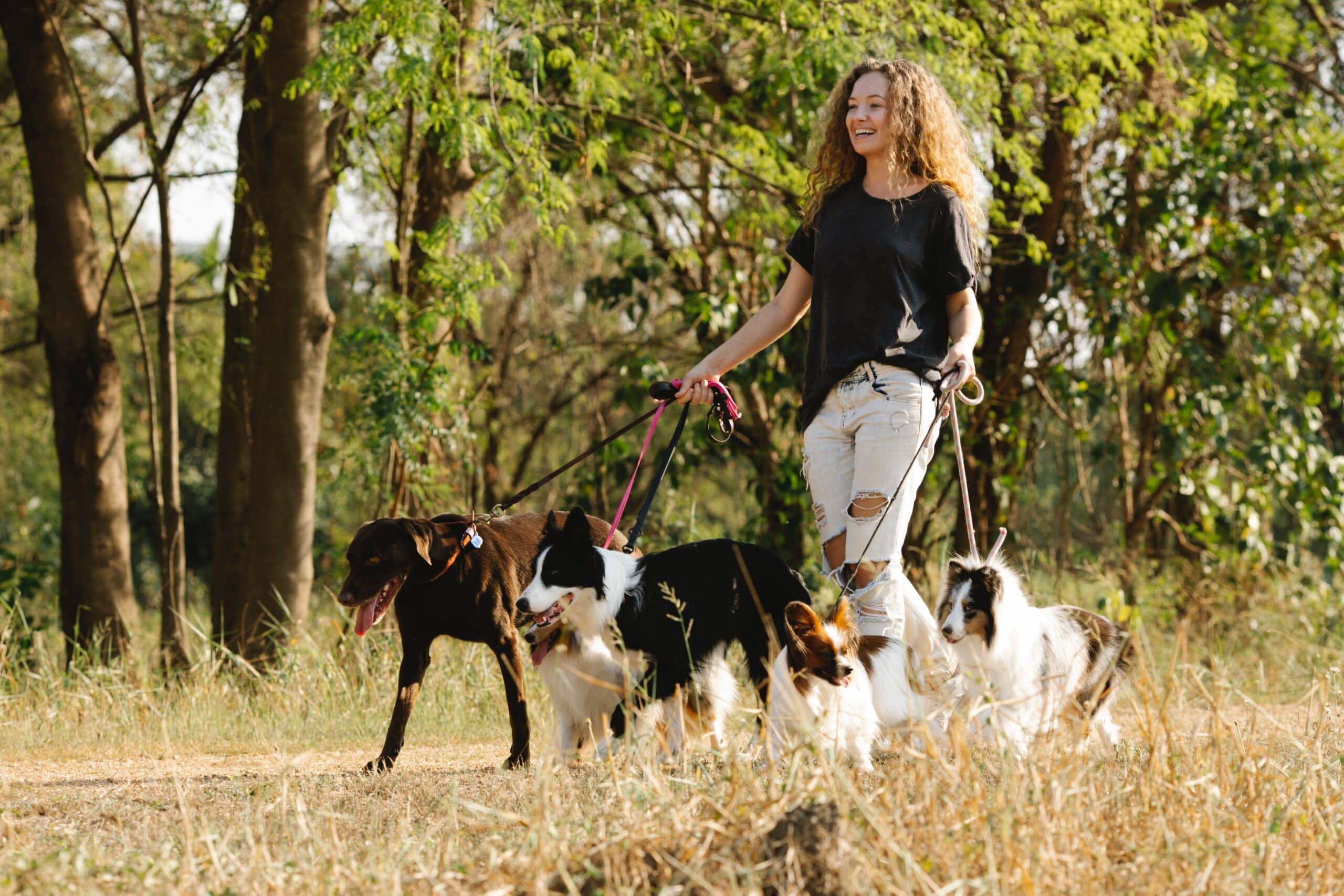How To Launch A Successful Dog Walking Business
Starting a dog walking business can be an exciting venture. The demand for expert dog care is on the rise, with the dog walking industry growing at a steady rate of 1.7% annually for the past five years.
This is why it makes sense for more budding petpreneurs to consider building a business around dog walking.
But just because you have a passion for dogs doesn’t mean you can simply lace up your sneakers, grab a leash, and hit the road. Starting your own pet care company takes a lot more than that. This guide includes all the information you need to get started.
No doubt, it might be overwhelming to take everything in at once. That's why we’ve broken down the process down into simple, easy-to-understand steps.
So first things first, you need to decide whether a dog walking business REALLY suits you.
Pros and Cons of Dog Walking Businesses
Like any other business, dog walking comes with unique ups and downs. Before getting started it's important to weigh up both the good and the not-so-pleasant sides of this area of business. Understanding what’s possible in this line of work will help you to face challenges better and enjoy the benefits more.
Pros of Dog Walking Business
- Simple business model: Launching and growing a dog walking business isn't as complex as many other businesses thanks to its simple model. Also, the startup costs for this type of business are significantly lower than many others.
- Independence: Since you're your own boss, you can control your workload. You'll decide how much or little you want to work. You'll have the freedom to set your own rates and your availability. (HINT: The Book Your Pet app has been designed to help you easily communicate rates and availability with clients, without endless messaging back and forth - they can even book at the click of a button!)
- Potential to build recurring revenue: When done correctly, you’ll have consistent clients who’ll pay weekly (or whatever your arrangement is), and that eliminates the stress of wondering where your next paycheck will come from.
- Great work hours: Dog walking is not as rigid as a 9-to-5 role. Although you typically have to work from Monday to Friday, many of your visits will be between 10am and 3pm, giving you plenty of time in the day to do other important things.
- Good exercise: Walking isn’t only beneficial to pets. You’ll also enjoy a good daily workout, which can improve your overall health and fitness level.
Cons of Dog Walking Business
- Repetitive work: This line of business might not be for you if you prefer something with lots of variety or you simply can’t stand repetitive jobs. Dog walking entails doing the same thing repeatedly and providing the same service, which can become tiresome.
- Finding clients can be tricky: You can’t depend on word-of-mouth alone to get new clients, especially if other similar businesses are in your community. It takes consistent effort to source new clients. (HINT: Book Your Pet has been designed to help you easily reach new clients in your local area!)
- Inconsistent work: While there is a possibility of earning recurring revenue, work can be inconsistent sometimes. If you don’t know how to properly track your business, dog walking can be a somewhat less stable income source for you.
- Working in inclement conditions: Dog walking is an all-weather business. You can’t simply cancel an appointment because the weather is too hot, cold, wet, or windy. You MUST be prepared to work in all weather conditions.
Undoubtedly, staying on top of your dog walking business can be very demanding. But you don’t have to live in 'survival mode' just because you have a pet business. Thanks to simple tech solutions like Book Your Pet, you can take all the stress out of starting and growing your business and focus on what you do best.

What Do You Need To Start A Dog Walking Business?
So you've decided that starting a dog walking business is the right move for you - What next? Let's take a look at the things you'll need to get your pet business off the ground.
Research The Local Dog Walking Business Landscape
The first thing you need is to understand the demand for dog walking services in your area. How many small companies provide the service? Are they enough clients or too few clients? Do your due diligence and come up with down-to-earth answers to these questions.
You'll likely struggle to land clients if you venture into an over-saturated market. It can be difficult to stand out from already-established competitors when clients are too few while still trying to turn a profit.
Create A Business Plan
Once you’ve determined that there’s a high-enough demand for dog walking services in your area, it's time to draw up a plan for your business.
Your market research will enable you to develop a well-written business plan. Although it's common for many petpreneurs to start small when walking pooches for pay, it's still important to create a plan.
Think of a business plan as the blueprint of your business. Without it, running a successful business can be difficult. Draft a plan that provides your business with a framework, goals, and strategies. This way, you won’t operate your dog walking business haphazardly.
Structure Your Business
Decide whether to register your dog walker business as a partnership, sole proprietorship, limited liability, or company (LLC). While there's no right or wrong choice here, the type of structure you choose for your small business as a professional dog walker will influence every aspect of your business, from daily operations to risks of your personal assets and taxes.
For this reason, it makes sense to learn more about the various business structures and decide which fits you best. Consider talking to a business advisor to provide further guidance.
Get A Business License And All Necessary Permits
Although requirements may vary between locations, you generally don’t need any kind of business license to operate your dog walking business. That said, it's usually a good idea to obtain an Employer Identification Number (EIN), commonly referred to as a federal tax identification number.
Consider getting a business license even if you plan to structure your business as a sole proprietorship. It's also important to get a business permit if it's required by law in your location.
The good thing about business licenses is that you generally don’t have to bother too much about them if you are just starting a dog walking business. You can put it off until your business starts to bloom.
Obtain Business Insurance
You can't completely rule out accidents when dealing with dogs. Apart from causing injury to others and themselves, dogs can sometimes damage property. It doesn’t matter whether your state requires insurance to operate your kind of business; obtaining business insurance protects you and your business.
Consider getting general liability insurance at the very least. You may want to also add personal insurance and commercial property insurance for extra peace of mind.
Whatever insurance you get, ensure that it covers any other employees you may have. It will cost you more to do this, but it's worth every cent!
Decide Your Pricing
Your rates will depend largely on how you run your business as well as your location. Researching the local dog-walking landscape should give you a fair idea of what other companies are charging.
It's usually good to set your rates to fall within the range of what is generally charged among other key competitors.
Prepare Your Service Agreement
It's common for a potential client to assume that you provide a certain type of pet sitter service because you walk dogs. This may lead to confusion and even disputes. To avoid this, make sure you are clear about your pet sitting and dog walker services in advance.
Never accept any dog without having a solid contract, policy statement, or service agreement in place. Clearly state the type of services and pet care you provide, what you do while the pets are under your care, and importantly what you DON'T do. Make sure to put this in writing at the outset of your agreement.
Your service agreement can include details such as your responsibilities, the breed of dogs you don’t accept, how long and where you walk dogs, and billing and payment information.
Remember to include some sort of clause for a 'trial period' in the service agreement before fully committing to walk a dog. This will allow you to terminate a contract without violating your agreement if a dog proves unmanageable within the trial period.
Get Transport
Think about how to get your canine chums to the park or public spaces for a walk. You may need to use your vehicle or rent one to transport the dogs. In either case, you should get animal bailee insurance or adjust your current vehicle insurance to cover your new business.
However, you may not need a car or van to transport the dogs if you only walk them within a small local area near your neighborhood.
Summary
Starting a dog walking business doesn’t have to involve investing a lot of capital. If you decide that a dog walking business is the right choice for you as a petpreneur, remember to keep things simple.
As a responsible dog walker you should only accept the number of clients (and dogs) you can easily manage. Once you have all of the elements above in place and feel confident and more established in your business practice you can look to expand your client base, your team, and your overall business.
Take time to master each phase before expanding your business and hiring more hands. Keep in mind that even the smallest businesses can be very demanding, and a dog walking is no different.
Book Your Pet has been designed by petpreneurs for petpreneurs to help you save time running your pet business. Discover more about how the app can help you launch and grow your dog walking business here.

